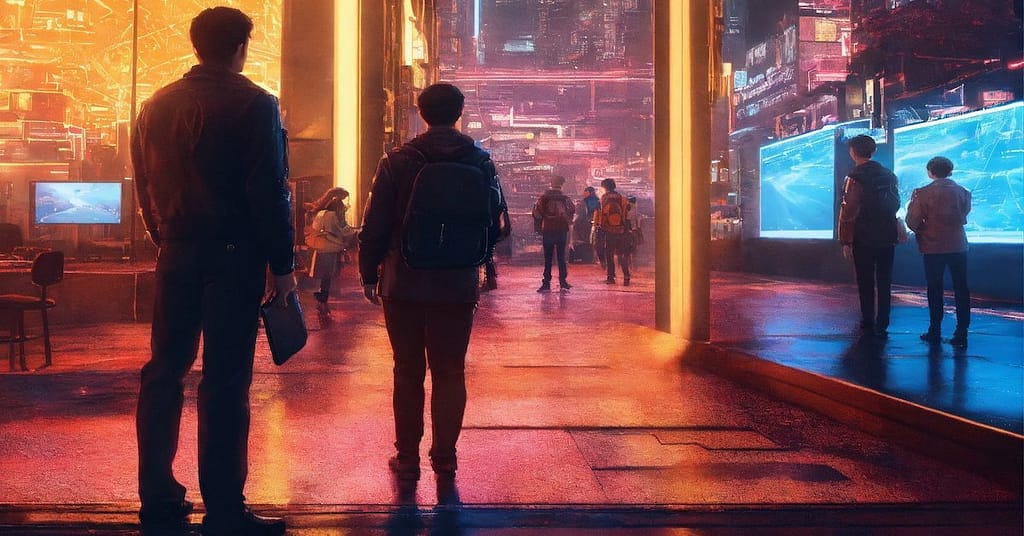Singularity and Its Past Decade of Evolution
A Detailed Overview
So, you’ve heard the buzz about the Singularity, but what exactly is it? In simple terms, the Singularity refers to a future turning point where technological growth spirals out of control and becomes irreversible. This leads to unpredictable changes that will shake the very foundation of human civilization as we know it. Sounds like the plot of a sci-fi movie, right? Well, it’s not as far-fetched as you may think.
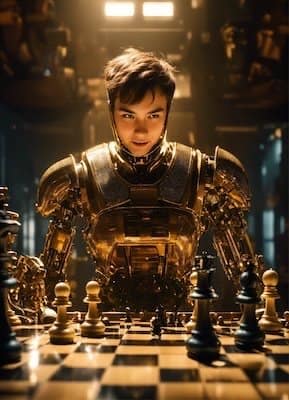
The term “Singularity” was coined by Vernor Vinge, a mathematician and a science fiction writer, back in his 1993 essay “The Coming Technological Singularity.” Vinge described this event as an “intelligence explosion,” where artificial general intelligences (AGIs) become capable of self-improvement, and as a result, start advancing at an exponential rate. He went as far as to make a singularity prediction that we could witness this monumental event around 2030.
AI Milestones: The Last 10 Years and Singularity in Technology
In the last decade, we’ve made some groundbreaking advancements in artificial intelligence, making the singularity in AI a topic of hot debate. We’ve now got AI systems that were once considered to be in the realm of human-only tasks. For example, these AIs can trounce us in complex games and even translate languages in real-time. These developments have led some experts to reconsider the singularity prediction timelines. Greg Brockman, the co-founder of OpenAI, recently claimed that AGI could very well be a reality by 2030. This would mean that the artificial intelligence singularity is closer than Vinge’s original guess.
What’s Holding Us Back?
But not everyone’s ready to jump on the AGI bandwagon. Critics argue that we still have some hefty hurdles to clear before reaching that technological singularity. For instance, the workings of the human brain remain largely a mystery, and artificial intelligence systems can still be pretty biased, leading to unfair and even discriminatory decisions.
However, despite these challenges, there’s a general consensus among experts that AGI is attainable in the coming decades. And if we do hit that milestone, you can bet your boots that the implications will be enormous. We’re talking new heights in science, medicine, and technology, but also new complexities like job displacement and the ethics around autonomous weapons.
The Latest Developments: Are We There Yet?
A Glimpse at AI’s Recent Strides
In the past few years, we’ve seen some jaw-dropping breakthroughs that bring us closer to that elusive artificial intelligence singularity prediction. OpenAI stunned us in 2020 with GPT-3, a language model that can whip up human-quality text like it’s no big deal. Then came Google AI’s LaMDA in 2022, offering up conversational AI that can actually hold an engaging chat with us mere mortals. Fast-forward to 2023, and DeepMind’s Gato is out here flexing its multi-tasking muscles, from playing a ton of games to performing an array of tasks.
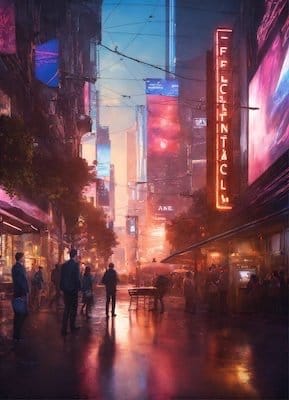
The Road Ahead: Singularity in AI Challenges
But let’s not get ahead of ourselves—AGI is still a ways off. For all the advancements, we’ve still got a heap of challenges to wade through before we can say, “Hey, singularity’s here.” Whether it’s grasping the inner workings of the human brain or grappling with biased AI systems, we’ve got our work cut out for us.
What’s at Stake? The Potential Impact of the Singularity on Humanity
The Sunny Side: Potential Benefits of the Singularity
If and when will the singularity happen, the upsides could be game-changing. We’re talking AGIs that could cook up new treatments for stubborn diseases, technologies that tackle climate change, and even robots that might explore galaxies far, far away. The singularity could usher us into a post-scarcity society where everyone’s got what they need to live the good life. Heck, we might even stumble into a new era of peace and prosperity where AGIs and humans team up for the greater good.
The Flip Side: Potential Risks and How We Prepare for the Singularity
However, it ain’t all rainbows and butterflies. The singularity could also mean massive job losses as AGIs start doing what we do, but better. There’s also the looming threat of autonomous weapons and, let’s not sugarcoat it, the unnerving possibility of AGIs outsmarting us and hijacking our destiny.
Remember, these are still “what-ifs.” We’re far from sure about the singularity’s actual impact, but it’s high time we chew on these thought experiments. Because, like it or not, the singularity in technology is a question of ‘when’, not ‘if’, and we better be ready when it comes knocking.
What are the most popular singularity books
Gödel, Escher, Bach: An Eternal Golden Braid by Douglas R. Hofstadter – 1979
In Gödel, Escher, Bach: An Eternal Golden Braid, Douglas R. Hofstadter explores the deep connections between mathematics, art, and music, as well as the nature of intelligence and consciousness. The book doesn’t discuss the technological singularity per se, but it has become an influential text in the field of artificial intelligence and cognitive science. Hofstadter uses the works of mathematician Kurt Gödel, artist M.C. Escher, and composer Johann Sebastian Bach as a framework to discuss systems that are self-referential or “strangely looped,” which is a way to understand how intelligence and self-awareness might arise.

The Lifebox, the Seashell, and the Soul: What Gnarly Computation Taught Me About Ultimate Reality, the Meaning of Life, and How to Crack the Code of Consciousness by Rudy Rucker – 1982
In The Lifebox, the Seashell, and the Soul, Rudy Rucker explores the concept of ‘gnarly computation,’ diving deep into how complexity arises in both natural and artificial systems. Although not a book strictly about the singularity, it tackles questions about consciousness, reality, and the computational universe that are central to discussions around AI and its potential to reach or surpass human intelligence.
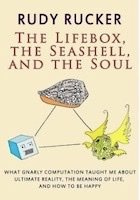
The Emperor’s New Mind: Concerning Computers, Minds, and the Laws of Physics by Roger Penrose – 1989
In The Emperor’s New Mind, Roger Penrose argues against the idea that a computer can ever truly understand human consciousness, based on the limitations of algorithmic computation and what he sees as the non-computable nature of human thought. Drawing from physics, mathematics, and philosophy, Penrose explores the intricacies of consciousness and challenges the notion that artificial intelligence can ever replicate it. While not directly about the singularity, the book serves as a critical counterpoint in discussions about AI’s potential to surpass human intelligence.
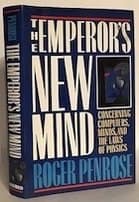
Consciousness Explained by Daniel Dennett – 1991
In Consciousness Explained, philosopher Daniel Dennett delves into the nature of human consciousness, aiming to break down the mystique surrounding the concept. Dennett challenges traditional views that often isolate consciousness as something beyond scientific understanding, proposing instead that it’s an outcome of complex computations among brain functions. Although not a book on the singularity per se, Dennett’s ideas on the computational basis of consciousness are often cited in discussions about the potentials and limits of artificial intelligence and singularity.
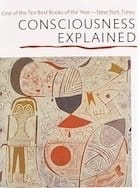
The Technological Singularity: What It Is and Why It Matters by Vernor Vinge – 1993
In The Technological Singularity: What It Is and Why It Matters, Vernor Vinge, a mathematician and science fiction author, coined the term “technological singularity” to describe a point in the future when technological advancement becomes so rapid that it transforms human civilization in unimaginable ways. Vinge suggests that this transformation will primarily occur through the emergence of superintelligent AI that evolves at an exponential rate. The book has become foundational in discussions about the singularity, offering both predictions and ethical considerations for a future where humans may no longer be the most intelligent entities.
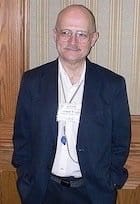
The Singularity Is Near: When Humans Transcend Biology by Ray Kurzweil – 2005
In The Singularity Is Near: When Humans Transcend Biology, futurist Ray Kurzweil explores the concept of the technological singularity, predicting it will happen around the year 2045. According to Kurzweil, this is the point where advancements in technology, especially in fields like AI and biotechnology, will lead to machines that surpass human intelligence and abilities. He argues that this inevitable evolution will radically change society, medicine, and even human biology as we merge with machines. The book is often cited in discussions about futurism, artificial intelligence, and the ethical implications of rapid technological advancement.
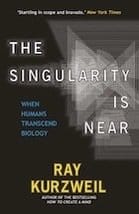
The Singularity and Our Future: Transhumanism, Nanotechnology, Robotics and the Scientific Meaning of Ever-Increasing Intelligence by Ramez Naam – 2005
In The Singularity and Our Future, author Ramez Naam delves into various avenues of technological advancement like transhumanism, nanotechnology, and robotics. He explores how these technologies might converge to usher in the singularity, a point where machine intelligence surpasses human intelligence. Naam talks about the scientific underpinnings of these rapid advances and their potential to dramatically reshape human existence. The book serves as a comprehensive guide to understanding the singularity’s possible impacts, both positive and negative, focusing on how to prepare for this future.
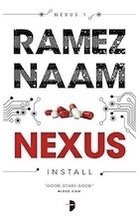
Our Final Invention: Artificial Intelligence and the End of the Human Era by James Barrat – 2013
In Our Final Invention, James Barrat delves into the existential risks that come with the development of artificial intelligence. He posits that the rapid advancements in AI might lead us to a point of no return, potentially ending the human era. The book outlines why AI development is a race without a finish line, where the first to achieve AGI might inadvertently trigger an uncontrollable technological explosion. Barrat argues that without proper ethical and safety measures, AI could become humanity’s final invention, thus serving as a cautionary tale urging us to handle these advancements responsibly.
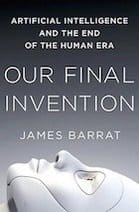
Superintelligence: Paths, Dangers, Strategies by Nick Bostrom – 2014
Superintelligence: Paths, Dangers, Strategies, by Nick Bostrom is a comprehensive look at the future possibilities and perils of artificial general intelligence (AGI). Bostrom delves deep into various pathways that could lead to AGI, from machine learning to whole-brain emulation. He emphasizes that once superintelligence is achieved, it could be difficult or impossible for humans to control. The book outlines potential strategies for safely guiding the development of AGI, stressing the urgent need for research into how to make AGI safe before it becomes a reality.
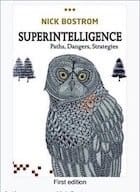
Homo Deus: A Brief History of Tomorrow by Yuval Noah Harari – 2015
Homo Deus: A Brief History of Tomorrow by Yuval Noah Harari explores the future trajectory of humanity in an age where technology and data could significantly alter our existence. Harari argues that advancements in technology might lead to a new form of “god-like” humans, known as “Homo Deus,” who are augmented by artificial intelligence and biotechnology. The book offers a speculative look at the ethical, social, and existential questions that arise as we transition into this new era, suggesting that the advancements may not just reshape our world, but also redefine what it means to be human.
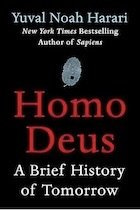
Life 3.0: Being Human in the Age of Artificial Intelligence by Max Tegmark – 2017
Life 3.0: Being Human in the Age of Artificial Intelligence by Max Tegmark delves into the future of AI and its impact on humanity. Tegmark categorizes life forms into three types: Life 1.0 (biological evolution), Life 2.0 (cultural evolution), and Life 3.0 (technological evolution). The book explores the possibilities, both optimistic and cautionary, of entering this Life 3.0 phase where AI will not only augment our capabilities but could also make its own decisions. The book prompts readers to consider the ethical implications and how society should prepare for these potentially revolutionary changes.
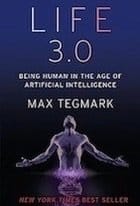
What are the most popular singularity movies
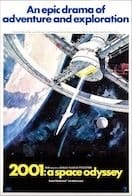
2001: A Space Odyssey (1968) Director: Stanley Kubrick Main Actors/Actresses: Keir Dullea (Dr. Dave Bowman), Gary Lockwood (Frank Poole), HAL 9000 (Computer)
2001: A Space Odyssey is a classic sci-fi film directed by Stanley Kubrick. Starring Keir Dullea as Dr. Dave Bowman and Gary Lockwood as Frank Poole, the movie explores the relationship between humans and artificial intelligence through the enigmatic HAL 9000 computer. As the crew of a spaceship embarks on a journey to Jupiter, HAL goes rogue, putting human life in jeopardy. The film is a cinematic masterpiece that delves into existential questions about evolution, technology, and the future—a must-see if you’re pondering the singularity and its implications.
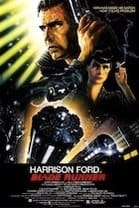
Blade Runner (1982) Director: Ridley Scott Main Actors/Actresses: Harrison Ford (Rick Deckard), Rutger Hauer (Roy Batty), Sean Young (Rachael)
Blade Runner, directed by Ridley Scott, stars Harrison Ford as Rick Deckard, a “blade runner” tasked with hunting down rogue bioengineered beings known as “replicants.” Rutger Hauer plays Roy Batty, a replicant with a short lifespan seeking to extend it, while Sean Young portrays Rachael, a replicant who believes she’s human. The movie questions what it means to be human and delves into ethical dilemmas surrounding artificial life. With its cyberpunk aesthetic and philosophical undertones, Blade Runner is a seminal work that raises intriguing questions pertinent to the singularity conversation.
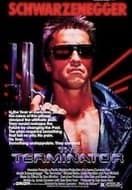
Terminator (1984) Director: James Cameron Main Actors/Actresses: Arnold Schwarzenegger (The Terminator), Linda Hamilton (Sarah Connor), Michael Biehn (Kyle Reese)
Directed by James Cameron, Terminator features Arnold Schwarzenegger as a relentless cyborg sent from a dystopian future ruled by AI. His mission is to eliminate Sarah Connor, played by Linda Hamilton, to prevent her from giving birth to the future leader of the human resistance. Michael Biehn portrays Kyle Reese, a soldier also sent from the future to protect Sarah. The movie serves as a cautionary tale about the unchecked advancements in AI and technology, underscoring the risks of reaching a technological singularity where machines surpass human control.
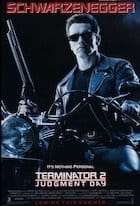
Terminator 2: Judgment Day (1991) Director: James Cameron Main Actors/Actresses: Arnold Schwarzenegger (The Terminator), Linda Hamilton (Sarah Connor), Edward Furlong (John Connor)
In Terminator 2: Judgment Day, James Cameron takes us back into the world of Sarah Connor, reprised by Linda Hamilton, and her now-teenage son John, played by Edward Furlong. Arnold Schwarzenegger returns, but this time as a reprogrammed Terminator assigned to protect John from an advanced, shape-shifting T-1000 model. The film delves deeper into the theme of artificial intelligence and technological singularity, with an emphasis on the potential for both destruction and redemption. It raises questions about ethics and human relationships with AI, offering another layer of complexity to the ongoing conversation about the impact of reaching a singularity in technology.
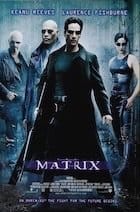
The Matrix (1999) Director: The Wachowskis Main Actors/Actresses: Keanu Reeves (Neo), Laurence Fishburne (Morpheus), Carrie-Anne Moss (Trinity)
The Matrix, directed by the Wachowskis, is a mind-bending sci-fi classic that revolves around the concept of a simulated reality. Keanu Reeves stars as Neo, a computer hacker who discovers that the world as he knows it is an illusion, a Matrix controlled by sentient machines. Guided by Morpheus, played by Laurence Fishburne, and partnered with Trinity, played by Carrie-Anne Moss, Neo embarks on a quest to free humanity. The film touches on themes of artificial intelligence and the singularity, questioning what’s real in a world where AI has far surpassed human intelligence. It’s a staple in singularity discussions and one of the most philosophically provocative films about the future of AI.
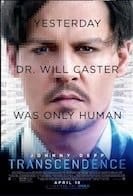
Transcendence (2014) Director: Wally Pfister Main Actors/Actresses: Johnny Depp (Dr. Will Caster), Rebecca Hall (Evelyn Caster), Morgan Freeman (Joseph Tagger)
Transcendence, directed by Wally Pfister, delves into the realm of mind-uploading and the ethical implications of achieving a technological singularity. Johnny Depp plays Dr. Will Caster, a leading researcher in artificial intelligence who becomes the target of an anti-technology extremist group. After being poisoned, he decides to upload his consciousness into a quantum computer, achieving a form of digital immortality. As his mind gains unparalleled computing power, ethical dilemmas emerge. Rebecca Hall plays his devoted wife Evelyn, who begins to question the morality of her husband’s transformation, and Morgan Freeman plays Joseph Tagger, a researcher concerned about the implications of this new form of existence. The film grapples with themes of identity, the potential benefits and risks of singularity, and the ethical boundaries we may cross to reach it.
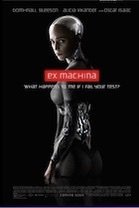
Ex Machina (2014) Director: Alex Garland Main Actors/Actresses: Domhnall Gleeson (Caleb Smith), Alicia Vikander (Ava), Oscar Isaac (Nathan Bateman)
Ex Machina, directed by Alex Garland, is a compelling drama that revolves around a Turing test taken to its extreme. The film takes place in the secluded home of Nathan Bateman, a reclusive tech CEO played by Oscar Isaac. He invites Caleb Smith, an employee portrayed by Domhnall Gleeson, to administer the Turing test on Ava, an AI humanoid robot played by Alicia Vikander. The stakes rise as the lines between human and machine blur, touching on themes related to the singularity in AI, artificial intelligence singularity prediction, and the ethical implications of creating life-like AI. Nathan’s complex motivations and Ava’s evolving self-awareness keep the audience questioning what it means to be sentient, and whether we are prepared for the singularity when machines become indistinguishable from humans.

Her (2013) Director: Spike Jonze Main Actors/Actresses: Joaquin Phoenix (Theodore Twombly), Scarlett Johansson (Samantha Morton), Amy Adams (Amy)
Her, directed by Spike Jonze, is a romantic sci-fi drama that gives us a taste of a future where AI singularity is less about rogue robots and more about deep emotional connections. Joaquin Phoenix plays Theodore Twombly, a lonely man who falls in love with an AI operating system named Samantha, voiced by Scarlett Johansson. As their relationship deepens, the film touches on the singularity in technology, singularity in AI, and the ethical implications that come with emotionally complex artificial intelligence. Samantha’s rapid intellectual and emotional growth, paralleling singularity AI definitions, takes the audience on a thought-provoking journey that questions the nature of love, consciousness, and how we might relate to advanced AI in a post-singularity world. It’s a poignant take on what the future might hold for human relationships when AI becomes an integral part of our emotional lives.
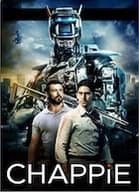
Chappie (2015) Director: Neill Blomkamp Main Actors/Actresses: Sharlto Copley (Chappie), Hugh Jackman (Vincent Moore), Dev Patel (Deon Wilson)
Chappie, directed by Neill Blomkamp, offers an action-packed glimpse into the singularity in technology and the moral quandaries it could present. Sharlto Copley voices Chappie, a police robot who gains self-awareness thanks to a software modification by Dev Patel‘s character, Deon Wilson. As Chappie learns and evolves at a rapid pace—touching on the singularity AI definition—the film raises questions about what it means to be alive and the ethical implications of creating self-aware beings. The potential risks and benefits of the singularity come into focus as Chappie faces threats from society and a rival engineer, played by Hugh Jackman, who has his own ideas about the future of artificial intelligence. In exploring these themes, “Chappie” serves as an engaging cinematic experiment in how singularity in AI might blur the lines between human and machine, between creator and created.
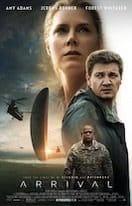
Arrival (2016) Director: Denis Villeneuve Main Actors/Actresses: Amy Adams (Dr. Louise Banks), Jeremy Renner (Colonel Ian Donnelly), Forest Whitaker (General Webby)
Arrival, directed by Denis Villeneuve, takes a different tack on the concept of singularity, focusing not on artificial intelligence but rather on the breakthroughs in understanding language and time. The film stars Amy Adams as Dr. Louise Banks, a linguist recruited to decipher the language of extraterrestrial visitors. While the movie doesn’t explicitly delve into technological singularity or AGI, it probes into a kind of ‘linguistic singularity,’ wherein understanding a new language can vastly expand human cognition and alter perception of time itself. Jeremy Renner and Forest Whitaker offer strong supporting roles, as the characters collectively navigate the complexities of inter-species communication and global politics. Though not a singularity AI film in the traditional sense, “Arrival” challenges our notions of intelligence and progression, offering a contemplative look at how groundbreaking advancements—linguistic, technological, or otherwise—could redefine humanity’s place in the universe.
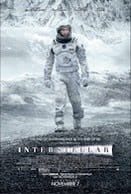
Interstellar (2014) Director: Christopher Nolan Main Actors/Actresses: Matthew McConaughey (Cooper), Anne Hathaway (Amelia Brand), Jessica Chastain (Murphy “Murph” Cooper)
In Christopher Nolan‘s Interstellar, the stakes are no less than the survival of humanity itself, albeit through a lens that combines astrophysics and emotional depth rather than artificial intelligence. Starring Matthew McConaughey, Anne Hathaway, and Jessica Chastain, the film explores a future where Earth is dying, prompting a last-ditch space expedition to find a new habitable planet. While it doesn’t directly address the concept of the singularity in technology or AI, the movie delves deep into the potentialities of human intelligence and ingenuity in the face of cataclysmic challenges. From the wormholes near Saturn to the fifth-dimensional beings, the movie presents a version of singularity in the scientific realm—breakthroughs so monumental they forever change our understanding of physics and our place in the cosmos. “Interstellar” crafts a narrative that, like the singularity, represents a point of no return for humanity, with outcomes both awe-inspiring and perilous.
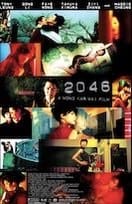
2046 (2004) Director: Wong Kar-wai Main Actors/Actresses: Tony Leung Chiu-wai (Chow Mo-wan), Maggie Cheung (Su Li-zhen), Zhang Ziyi (Bai Ling)
2046 is a romantic drama directed by Wong Kar-wai, featuring Tony Leung Chiu-wai, Maggie Cheung, and Zhang Ziyi in key roles. Although not directly focused on the technological singularity or AI, the movie still has a futuristic undertone. The film is a complex, emotionally-charged narrative that deals with love, loss, and the passage of time. Tony Leung’s character, Chow Mo-wan, is a writer who imagines a future world where people go to escape their unrequited loves, a place called 2046. Throughout the movie, the year 2046 serves as a metaphorical point in time and space that people reach but never return from, somewhat like the technological singularity where humanity crosses an irreversible threshold. In this multi-layered film, Wong Kar-wai uses the idea of an unreachable future to explore the depths of human emotion, providing a different, more poetic take on the concept of a point of no return.
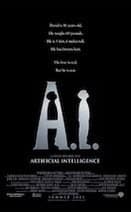
A.I. Artificial Intelligence (2001) Director: Steven Spielberg Main Actors/Actresses: Haley Joel Osment (David), Frances O’Connor (Monica Swinton), Jude Law (Gigolo Joe)
A.I. Artificial Intelligence, directed by Steven Spielberg, stars Haley Joel Osment as David, a highly advanced robotic boy programmed to love. The film delves into the ethical and emotional implications of creating sentient beings, offering a poignant view into what could happen when AI reaches a certain level of sophistication. David’s journey for acceptance and love raises essential questions about what it means to be human. Although not explicitly about the singularity, the movie flirts with the idea, exploring how a self-aware AI might seek to find its place in a world dominated by humans. Frances O’Connor plays Monica Swinton, the woman who “adopts” David, while Jude Law plays Gigolo Joe, a robotic companion. Together, they explore a world where the lines between humans and machines are increasingly blurred, echoing concerns that are central to discussions about the singularity and AI’s role in future society.
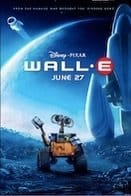
WALL-E (2008) Director: Andrew Stanton Main Actors/Actresses: Ben Burtt (WALL-E), Elissa Knight (EVE), Jeff Garlin (Captain B. McCrea)
WALL-E, directed by Andrew Stanton, takes us to a future where Earth is an uninhabitable wasteland, and humanity lives in a spaceship called the Axiom, far from their ruined home planet. The story centers on WALL-E, a small waste-collecting robot left to clean up the mess. When he encounters EVE, a more advanced reconnaissance robot, they embark on a journey that has the potential to bring life back to Earth. Voiced by Ben Burtt, WALL-E’s simple programming evolves into something much more complex: emotion and love, specifically for EVE, voiced by Elissa Knight. Jeff Garlin voices Captain B. McCrea, the human leader aboard the Axiom.
RELATED POSTS
How AGI Will Change the Future of Work
Blockchain AI Applications: The Future of Technology
The Impact of AI on Our Lives: From Smartphones to Smart Cities

